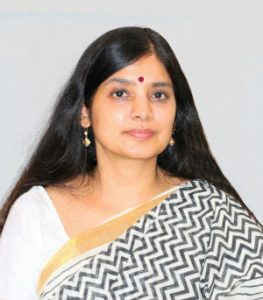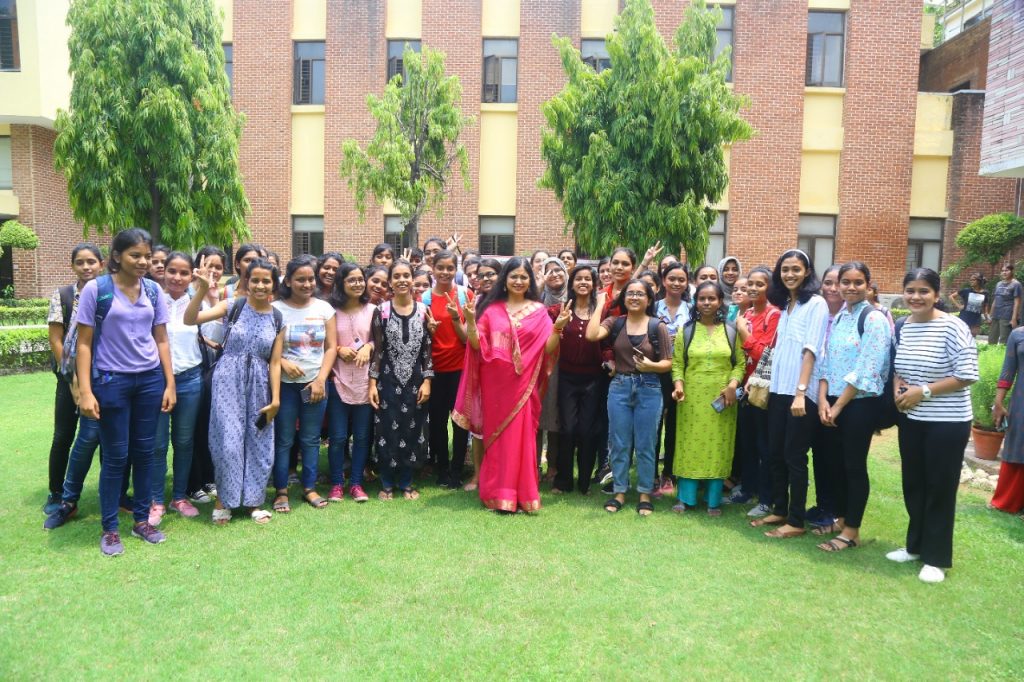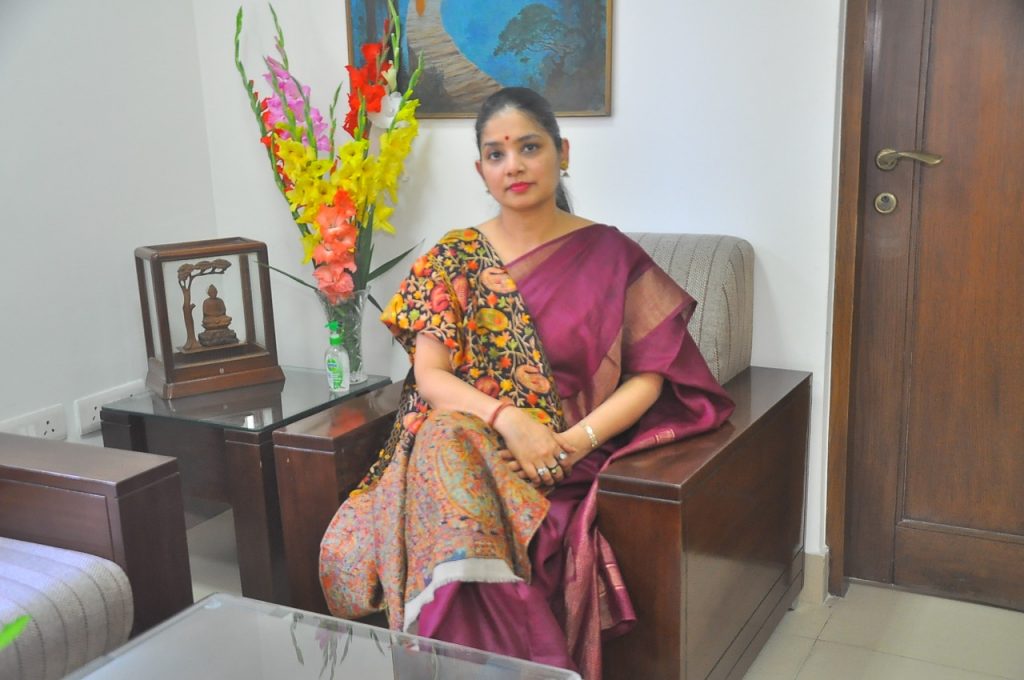Bhubaneswar: Five years hence, I would start working on my dream project in Odisha, an institution on the lines of Bhagat Phool Singh Mahila Vishwavidyalaya, Haryana, which starts from school and goes up to master’s and PhD while engaging in skill development programmes,” said Odisha-born academic and Miranda House principal Bijayalaxmi Nanda, who is currently basking in her college’s top performance in the NIRF rankings 2022.
In a telephonic conversation with Odisha Bytes, Nanda said “a complete institution” is her idea of contributing to women’s education in her home state where she would ultimately return after 10 more years in service. “Hopefully, with the support of others, we will be able to build an institution where education is highly accessible and highly affordable. Along with it, I would like to start a facility for children with special abilities. I don’t see learning centres for such children in schools here as is the case in Delhi. That could be another area,” she said.
A native of Cuttack and alumna of Utkal University, Bhubaneswar, Nanda said she had planned to work on this dream project of hers five years ago. “Then I got this position and decided to stay on. As a teacher in the chair, I have been able to develop an administrative side to myself and this experience will also help me in realising my dream,” she said.

A professor of political science and gender studies in Miranda House, she was elevated as principal in March 2019. While it was an honour to lead a reputed institution, it came with many challenges. “The ultimate aim was to maintain its legacy. It was important to bring everyone together so that the same sense of belongingness remains and continues. That I would say comes from a very Odia wisdom,” she said.
Elaborating further, Nanda said that most people thought that she was too soft to be a leader. “I think softness helps you learn a lot many things and can be a way to lead. Odias are humble, soft but very firm. They work with dedication and they are honest. These are generic qualities. We may be soft and polite, but at the same time, we are aware. We are sensitive,” she said.
“I have learnt through the wisdom of faculty members. My approach has been non-hierarchical and democratic. The idea was to encourage all stakeholders to participate as equals. Ultimately, it is empathy that can help you learn about others and understand an institution better,” she added.
Nanda attributed this to the institution’s top performance. “While many people have contributed to its success, I can say I have been successful in sustaining those energies,” she said.
MIRANDA HOUSE SUCCESS STORY
Nanda said they kept working on the parameter like teaching-learning resources, research and professional practice, graduation outcome, outreach and inclusivity and strived to improve on them “These parameters become an indicator for action. And then there is perception, which is not in our hands,” she said.
On what helped Miranda House retain the first rank for the sixth year in a row in the college-wise ranking, she said: “Our research output is very good. We have really focussed a lot, particularly in science on creating multi-disciplinary research centres. Involving students in research has been a legacy of Miranda House and it has improved over the years. Some students have also written papers with teachers. Our outreach and inclusivity indicators are also very well developed.”
Stating that teaching-learning across DU is more or less the same, she said the relationship between teachers and students in Miranda House stands out since the focus has been on mentorship.

“These parameters are not just for ranking, we take them as a way of improving the performance of the college, keeping the students at the core of the planning. Since every college is working on those parameters and everyone is striving to do well, these become areas of healthy competition, particularly since it is linked to outreach and exclusivity,” she said.
“It is a kind of motivation. Once you know you are excelling in a certain kind of ranking framework, you want to keep improving on it and maintaining it.”
ROAD AHEAD
Two years ago, one more criterion was added to the parameters and the colleges were also asked to focus on Unnat Bharat Abhiyan inspired by the vision of transformational change in rural development processes by leveraging knowledge institutions to help build the architecture of an inclusive India. “This time, the focus will be on skill development and employability. We are keen on engaging with integration labs for skill development and also working on the India knowledge system, developing language labs for translations. It will provide us motivation for action and align our goals with the National Education Policy,” she said.
INTERNATIONAL RANKINGS
While colleges have never participated in international rankings, universities are improving on QS ranking with the focus shifting to publications, she said.
Arguing in favour of Indian universities, Nanda said the government institutions here are highly subsidised, having an outreach for everyone while global parameters concentrate on the teacher-student ratio. “Our universities are managing well with little resources that no global parameter can measure. A small college in a tribal area in India is able to cater to a large number of students across diversities and bring them up to the graduate level and you cannot measure it even with a college in a capital city,” she said.

“With National Education Policy aligning many things, some India-centric ranking parameters can permeate the global parameters and we will be in a better position. But we need to develop our capacity when it comes to publications and produce stringent quality work. There is motivation and it will also help achieve the teacher-student ratio.”
“The universities are slowly understanding the ranking system better. It requires certain acclimatisation. With the government, especially the Education Ministry, putting so much emphasis on ranking, parameters, accountability, transparency and accessibility, I am sure we will not be very far off, when global ranking may soon have India-centric parameters.”
Nanda was equally optimistic about the internationalisation of education in India. “Bringing universities to international shores as is the case with Singapore will change a lot of things,” she said.
EDUCATION IN ODISHA
The academic said people in Odisha need to open up to understand the linkages and go for more collaborations. “We had a collaboration with Rama Devi Women’s University. I visited the varsity and we conducted a faculty development programme and made an effort to strengthen the research system. The ability to connect is important,” she said.
According to Nanda, collaborations will help to learn together, share resources, especially in faculty and student exchange programmes. “It will provide an impetus for greater learning. The institutions in Odisha are very good, and I studied at Utkal University, we have resources and very good faculty but all we need is better leadership and a vision. There is a need for focus and synergy with the Education Ministry is what I feel. The state has to provide support and mobilise resources for research,” she added.
ODIA PRIDE
Nanda feels it is a good time and a proud moment for Odisha. “Odias are being recognised. The Education Minister is an Odia and so is the head of colleges in DU. Some Odias are also occupying the principal post in some leading DU colleges,” she said.
In her effort to revive Odia pride, she actively participated in Rath Yatra celebrations, which were organised in DU in association with ISKCON and DU Odia Students’ Association. “The best way to feel rooted and connected to one’s state is through culture and food,” she said.
The association is also helping Miranda House to bring out one Odisha chapter on Unsung Women Heroes of India as part of Azadi Ka Amrit Mahotsav. “We will be presenting a play and also put up an art exhibition on them. We are also planning to bring out a booklet on the same,” she added.
And what is it that she misses the most about Odisha? “I miss my people, the ambience of affection, the connectedness and a sense of comfort. Maybe that’s why I visit my state often,” she said before signing off.


